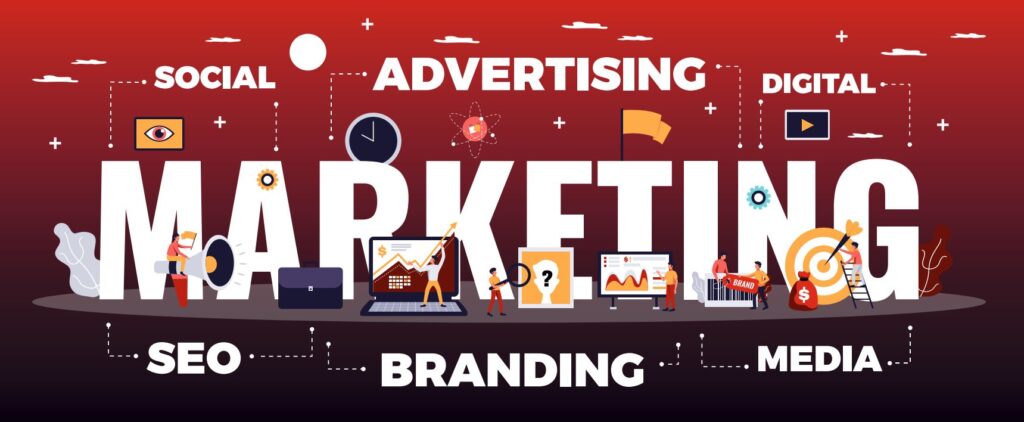
Digital marketing refers to the use of digital channels, platforms, and technologies to promote products, services, or brands to a target audience. It encompasses a wide range of online marketing activities and strategies aimed at reaching and engaging with potential customers through various digital mediums. Digital marketing leverages the internet and electronic devices, such as computers, smartphones, tablets, and social media platforms, to connect with and influence consumers. Here are key components and strategies within digital marketing:
Website Marketing:
- A well-designed and user-friendly website is often the centerpiece of digital marketing efforts. It serves as a hub for information about a company’s products or services and can facilitate online transactions.
Search Engine Optimization (SEO):
- SEO involves optimizing a website’s content and structure to improve its visibility in search engine results pages (SERPs). The goal is to increase organic (non-paid) traffic by ranking higher for relevant search queries.
Content Marketing:
- Content marketing involves creating and sharing valuable, informative, and engaging content, such as blog posts, articles, videos, infographics, and podcasts, to attract and retain a target audience.
Social Media Marketing:
- Social media platforms like Facebook, Instagram, Twitter, LinkedIn, and others are used to build brand awareness, engage with followers, and promote products or services. Paid social media advertising is also common.
Email Marketing:
- Email marketing involves sending targeted email campaigns to a list of subscribers or customers. It can be used for promotional purposes, customer retention, and lead nurturing.
Search Engine Marketing (SEM) and Pay-Per-Click (PPC):
- SEM includes paid advertising on search engines like Google and Bing. PPC advertising allows businesses to bid on keywords and pay only when a user clicks on their ad. Google Ads is a popular platform for PPC campaigns.
Affiliate Marketing:
- Affiliate marketing is a performance-based strategy where businesses reward affiliates (partners) for driving traffic or sales to their website through the affiliate’s marketing efforts.
Influencer Marketing:
- Brands collaborate with influencers in their niche or industry to promote products or services to the influencer’s engaged audience.
Online Advertising:
- Online advertising includes various ad formats and placements, such as display ads, banner ads, video ads, and native advertising, which can be placed on websites, social media, and other online platforms.
Mobile Marketing:
- Mobile marketing targets users on mobile devices through strategies like mobile app advertising, mobile-optimized websites, and SMS (text message) marketing.
Analytics and Data Analysis:
- Digital marketers use web analytics tools to track and measure the performance of their campaigns, analyzing metrics like website traffic, conversion rates, click-through rates (CTR), and return on investment (ROI). Data-driven insights help optimize marketing strategies.
Marketing Automation:
- Marketing automation platforms allow businesses to automate repetitive marketing tasks, such as email campaigns, lead nurturing, and customer segmentation, based on user behavior and preferences.
Chatbots and AI Marketing:
- Chatbots and artificial intelligence (AI) are used to provide personalized customer support, engage with website visitors, and assist with product recommendations.
E-commerce Marketing:
- Digital marketing strategies tailored to e-commerce businesses focus on increasing online sales, improving user experience, and reducing cart abandonment rates.
Remarketing and Retargeting:
- These strategies involve targeting users who have previously interacted with a website or app, serving them relevant ads to re-engage and convert them.
Digital marketing is a dynamic field that continues to evolve as technology and consumer behavior change. Effective digital marketing strategies require a deep understanding of the target audience, data analysis, and a commitment to staying updated with industry trends and emerging technologies. It allows businesses to reach a global audience and track the performance of their marketing efforts more accurately than traditional marketing channels.